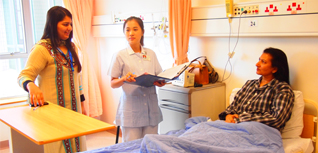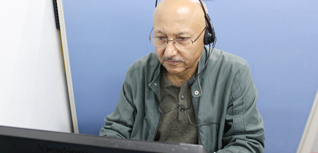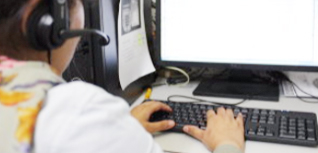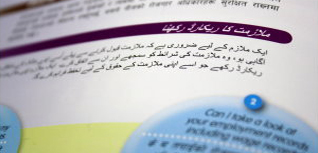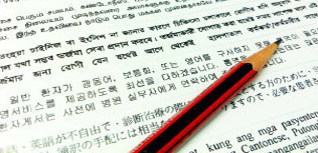Stories about Ethnic Minorities
Healing the society – A story of an ethnic minority interpreter
“Every time when I go to the hospitals, I keep reminding myself that I am professional so I should not be emotional during interpretation,” said Hussain Yasmeen. Hussain is a Pakistani and a medical interpreter in HKTS, who knows Chinese and English as well as Urdu, Hindi and Punjabi. However, the advantage of knowing five languages is only the basic requirement of being an interpreter. She emphasized that it is a life-long learning process to be an interpreter.

Professional interpreter training course
As a social enterprise, HKTS not only provides translation and interpretation services for ethnic minorities who are unfamiliar with Chinese/English, but also offers employment opportunities for those who have received higher education. Before working in HKTS, Yasmeen worked as a programme worker in a community centre where she had to provide interpretation for ethnic minorities. She realized that she was not a good interpreter, after joining the training courses held by Employees Retraining Board and HKTS respectively. In the past, Yasmeen only translated the so-called “important” parts of the conversation, but not all the contents. Now, she is much more professional and serious. “In order to maintain an objective attitude, I would never add or delete the original contents. Otherwise, it may bring decisive effect to patients’ health and even life,” Yasmeen stated. In leisure time, she prefers reading more translation-related books, so that she can become a more professional interpreter.
Meeting the challenges
As a medical interpreter, Yasmeen thinks that going to the hospitals is a part of daily life, but sometimes she faces a number of great challenges. She has to provide assistance for the patients who need to receive follow-up consultation, but also the patients who are going to have surgeries. Whenever stepping into the operating room, she feels uncomfortable but her performance can never be affected. “I really don’t want to do this kind of cases. However, I can still provide accurate interpretation service because the patients need me.” Now, she is an experienced interpreter but she still treats every case as a challenge to further encourage herself to do the best. The satisfaction gained is especially the driving force to her.
Healing the society.Helping herself
After moving to Hong Kong, ethnic minorities usually encounter difficulties in seeking employment because of language barriers. Most of them do not have other options but become manual labourers. Hussain Yasmeen, a Pakistani, is one of the lucky few. Her good language skills landed her a job as a medical interpreter in a social enterprise called Hong Kong TransLingual Services. Not only can she provide assistance to her fellow countrymen, but also achieve self-enhancement. Her job is a part of her life now.

Changes after working as an interpreter
Yasmeen’s personality and value were changed by her job as an interpreter. As she is proficient in Urdu, Hindi and Punjabi, she can provide interpretation services for Pakistani and Indian patients. She has coped with different people and things since being an interpreter several years ago. She realizes that she is much more patient as it takes time to explain the medical terms to patients. Also, she often deals with the issue about “life and death”, which makes her adopt a “let-it-be” attitude in daily life. As a medical interpreter, Yasmeen is not able to cure patients. Yet, she is touched by their strong will in times of adversity. “I would pray for the patients and hope they will get well soon”, said Yasmeen.
Praying for comfort and healing
Sadly, neither can all patients be tough, nor can they manage to get well soon. Sometimes, praying is not only a kind of comfort to patients, but also to the interpreters themselves. Yasmeen was upset when she once interpreted for a family who had a dying newborn baby. Since the baby was born, he had been kept in an oxygen tent in the hospital. “The diagnoses were pretty much the same every time. The doctor pointed out that the baby would not recover and would pass away very soon…” she recalled the memory with frustration. That is why she struggled every time before telling the family the truth. The baby had been tormented before having a chance to know about the world. It can be imaginable that both the baby and his family were exhausted. Although the family was shaken by the result every time, it was Yasmeen’s job to tell them the heartbreaking truth. After finishing interpretation, she was very emotional and depressed, and thus she kept praying for the baby and his family. Undoubtedly, facing “life and death” becomes a part of her job, but it always takes time for her to make peace with it, especially after handling this kind of distressing case.
Interpreters: Angels of patients
Fortunately, Yasmeen not only shares the pain of the patients, but also their happiness. “One patient was so excited (after telling her about the good news of her recovery) and threw her arms around me,” smiled Yasmeen. The patient had heart disease and was in need of surgery, but sadly, she had never got any good news in the follow-up consultation. Incidentally, Yasmeen became the very first one to announce the good news to her so she could hardly conceal her excitement. The role of interpreter is simply the bridge between doctors and patients. Yet, without the company of family members, the ethnic minority patients can only count on the support and encouragement from the interpreters who can speak the same language.
Patients becoming over-reliant
Every now and then, Yasmeen is worried by the patients’ reliance on her. Some patients would tell Yasmeen every detail about their health conditions, starting from the minute when they know she is their interpreter. As patients only have limited time to consult the doctors in one session, they are worried that they may not be able to explain their situations in detail. They therefore hope that Yasmeen can explain everything to the doctors on their behalf to save time. Nevertheless, this is not how simultaneous interpretation works. “As an interpreter, I should tell both parties what I hear right away to ensure the accuracy of the contents. If patients tell me everything before meeting the doctors, I may leave out some key information by accident, which would further lead to incorrect diagnosis,” explained Yasmeen. In such cases, she would politely interrupt the patients and then explain her own intention patiently.
Self-improving to help more ethnic minorities
Because of patients’ need and hope, Yasmeen realized the great demand for medical interpretation for ethnic minorities. Thus, she usually reads books about interpretation in her spare time, in order to provide more assistance to her fellow countrymen.





